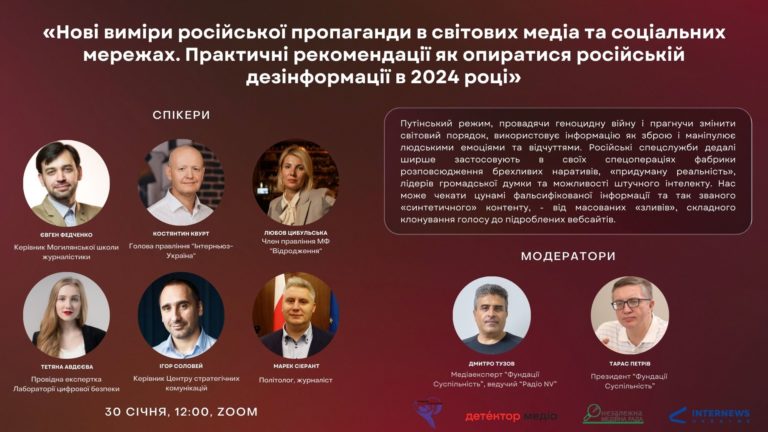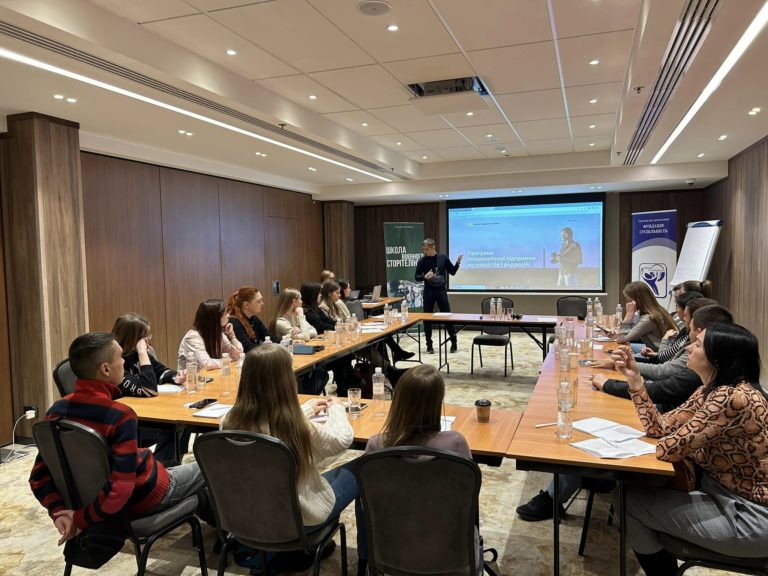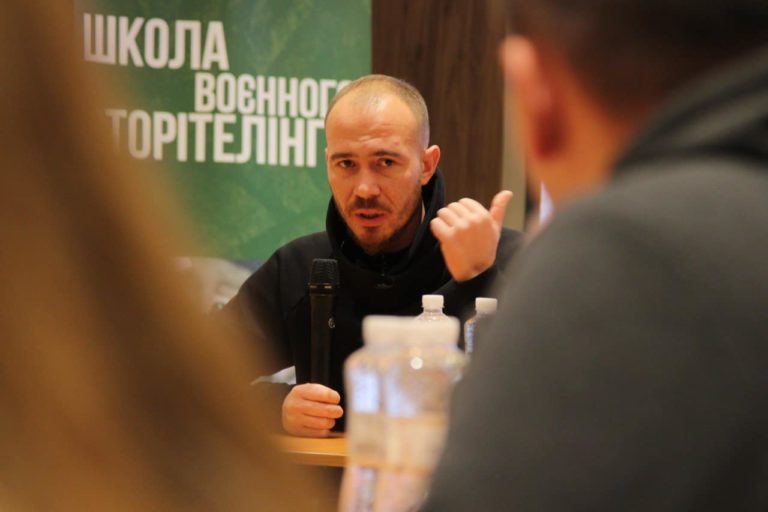On November 17, during an hour and a half, the experts discussed online whether and how it is possible to resist media owners’ interference in the media’s editorial policy.
This expert discussion was organized by Souspilnist Foundation with the support of Internews Ukraine, Detector Media and the Independent Media Council. The event aimed to provide expert analysis of the current practice of journalists’ dependence on media owners’ / investor’s / stakeholders’ interference in editorial policy, look for new ways to comply with journalistic standards, and discuss the peculiarities of the development of political and media market in Ukraine.
The discussion was attended by Zurab Alasania, Chairman of the Board of UAH:PBC, Anna Babinets, head of the agency of journalistic investigations Slidstvo.Info, Larysa Ivshyna, editor-in-chief at Den newspaper, Nataliia Lihachova, editor-in-chief at Detector Media, Bohdan Kutiepov, journalist at Hromadske TV, Dmytro Khorkin, general producer at Ukrayinske Radio, Tetiana Troshchynska, editor-in-chief at Hromadske Radio, Nataliia Humeniuk, co-founder of the Public Interest Journalism Lab and UA:PBC manager, Mariia Pysarenko, special correspondent of Channel 5, and Borys Davydenko, editor-in-chief at LIGA.net.
The discussion was moderated by Dmytro Tuzov, NV Radio host, and Taras Petriv, president of Souspilnist Foundation.
The discussion started off with Dmytro Tuzov’s quick question-and-answer session as to whether Ukrainian journalism is over the “serfdom” stage, when some employees performed the role of “service personnel” on party platforms, with some of them openly broadcasting pro-Russian views.
The experts agreed that this stage is yet to be passed. Nataliia Lihachova noted that some sort of generational change took place – most of the employees at central TV channels today are in a situation of “voluntary slavery”, where, in addition to high wages, there is a high risk of being bribed by entrance to politics. Nataliia Humeniuk added that the situation could be assessed differently, but party journalism is a fact.
“Now we are observing a huge competence crisis – on the one hand, of the audience, and on the other hand, of the journalists, if we consider them such. We also see a huge ethical crisis. Cynicism becomes a kind of standard, and as soon as you start talking about standards, you are immediately faced with a manipulative method of dividing journalists into sorts. I really don’t like that, because it’s not about the sorts of journalists, but about the fact that someone is a journalist and someone is not. Therefore, for me it’s an important challenge and an important task to talk to the audience so that at least some of them understand that “wild stuff” is not journalism, and journalism is not “wild stuff”, Tetiana Troshchynska said.
Among the possible options for overcoming the current crisis in the field of journalism, specifically the owners’ significant influence on the media’s editorial policy, Nataliia Humeniuk expressed the idea of strengthening the independent media – their amplification – when, for example, UA:PBC strengthens Hromadske Radio, Hromadske Radio strengthens Slidstvo.Info, and thus the media working to the standards strengthen their positions. Also, the National Council should review editorial charters, their observance and modification.
“For starters, those editorial charters need to be reviewed and it should be checked who adheres to them. Well, it can’t be that there are really editorial teams on “Nash” or “Inter” – it’s most likely a phantom. Secondly, in 2020 we have the right to demand a standard, much stricter and more serious charter. Because the current charter is an agreement, agreed to by the oligarchs in 2005,” said Nataliia Humeniuk.
According to Bohdan Kutiepov, creating one’s own media could be a way to oppose the oligarchy, just as make public the activities of the media and particular journalists not working to the standards.
“It should be documented. Maybe we should create a project like “Lie Detector” so we can form a list of propagandists and disinformers who don’t work as journalists. There’s no need to harass them, but this list should be available to see a person’s background, – Nataliia Lihachova agreed. – Secondly, we really need a new movement now. I believe it should be a reincarnation of the media movement.”
The expert discussion also centered around implementing legislative changes, values and self-regulation.
For more, watch the video:
This event was made possible with the support of USAID-funded Media Program in Ukraine, implemented by Internews, and with the help of private patrons.


